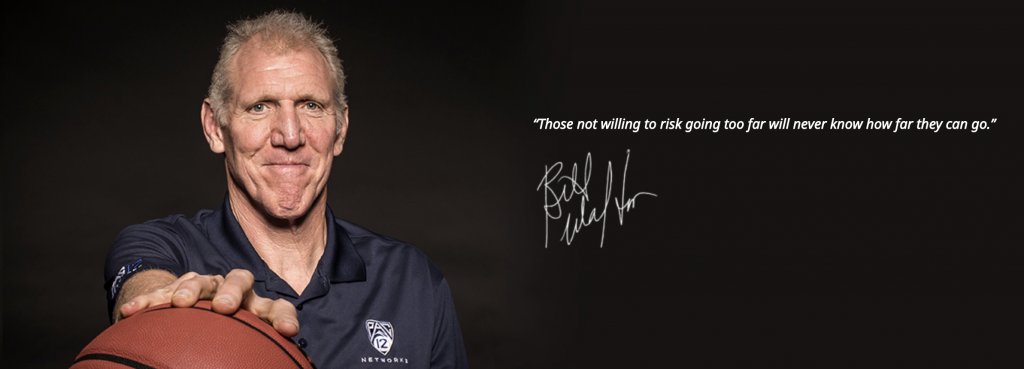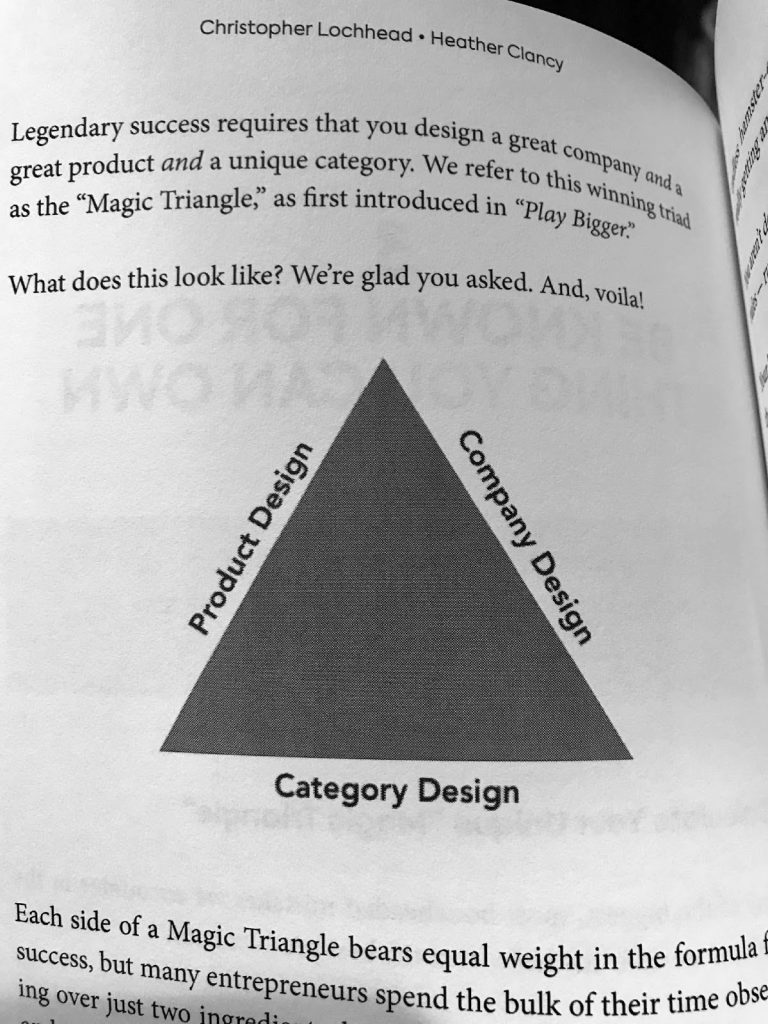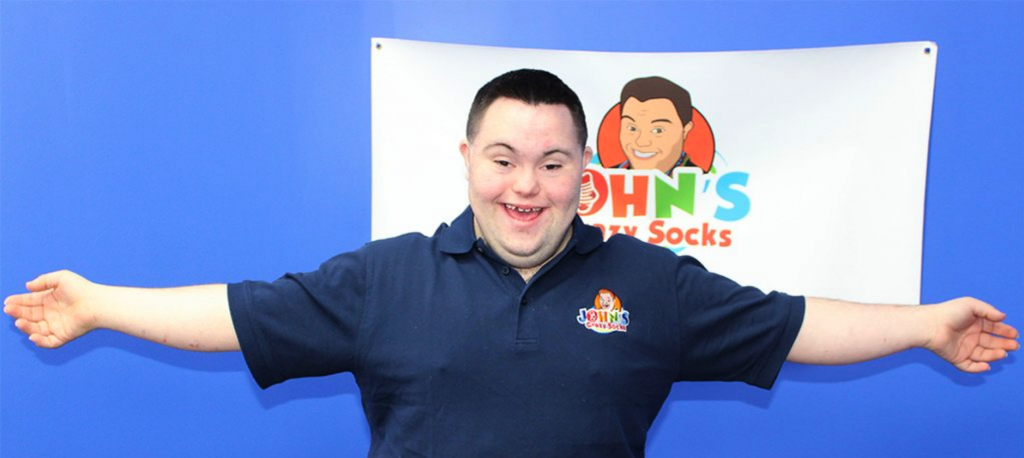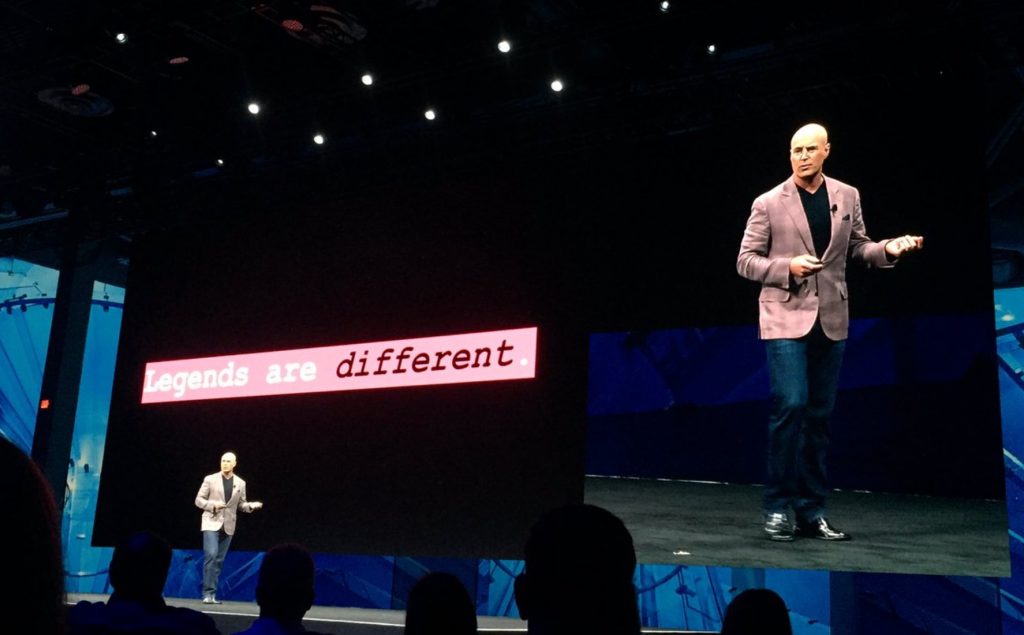3 Women Who Are Changing The Way We Think About Designing A Product

The best way to design a category is to find a problem, articulate it powerfully, and make sure others see the solution as you see it.
By Christopher Lochhead
Most of us can’t go a single hour without reaching for our iPhones.
But nobody even knew why they needed an iPhone until Steve Jobs told them. And he did it by creating a brand-new category: a touch-enabled “smartphone” that can connects to the internet and doubles as a media player.
Rather than simply solving the problem of, “What should a phone be capable of?” Jobs redesigned the problem by showing us, then conditioning us, to equate smartphones with his product. He owned this niche. Today, it’s still the standard against which all other smartphones are measured—with over 1 billion iPhones sold and counting.
To build lasting brands and products, legendary companies focus on category design, the purposeful and proactive decision to be different, to stand out from everybody else. Category design is about creating demand for something entirely new, rather than chasing share in an existing market.
The best way to design a category is to find a problem, articulate it powerfully, and make sure others see the solution as you see it.
Here are three female Entrepreneurs (with a capital “E”) who have nailed category design, and what you can learn from them:
1. Sara Blakely (Founder of Spanx): How To Identify A Category
Category designers are on a mission to solve a problem in a new, better way. To make a difference in the world.
Sara was a fax-machine salesperson who grew more and more frustrated with the challenge of getting her pants, skirts, and dresses to hang on her body just right, without unseemly bulges. To give her appearance a sleeker look, she used to cut the feet out of her pantyhose and wore this modified garment under her clothing.
Sara knew she wasn’t the only woman with this problem, so she worked for two years to turn her idea into a bonafide product while continuing to sell fax machines.
Although she didn’t have any experience in fashion or retail, she did have an infectious enthusiasm for how her undergarments could help other women. She was a missionary, and her goal of solving a common problem led to Spanx, a wildly successful new underwear category.
By narrowing the problem and niching down, Sara established herself as a billion-dollar category queen.
And she became the youngest self-made billionaire (of any gender) in the U.S.
2. Debra Sterling (Founder of GoldieBlox): How To Prevail In The Face Of Rejection
Category designers are rebels: they break the rules, flout convention, defy the odds. But as a result, they often face pushback from the establishment.
Debra, who studied engineering and product design at Stanford University, was inspired by her friend’s story of playing with her brother’s construction toys as a child, there were no alternatives for the fairer sex. She saw the lack of building blocks for girls as a golden opportunity to fill an unmet need and expose young women to the male-dominated field of STEM.
Her solution was simple, but her path to success was difficult.
For one, the toy industry, plagued by gender stereotypes and outdated ideas about consumer demand, wasn’t receptive. Then she was rejected by Y Combinator, a reputed organization that funds early-stage tech startups.
[Oh right—did I mention the VC universe is decidedly male-centric with its investments—female founders received just 2% of venture capital funds in 2017. Many male VCs weren’t interested in her product.]
But Debra persisted. She started a Kickstarter campaign and raised more than $285,000 for GoldieBlox, demolishing expectations.
Her company has now sold more than one million toys worldwide. But even more importantly, she’s empowering young girls to learn about the sciences from an early age.
Because Debra wrote her own rules rather than chasing share of the existing market, she successfully reimagined the toy category from a brand-new, female point of view.
And she dominated the category.
3. Dushka Zapata (Top Writer on Quora): How To Design And Dominate A Category
In hyper-competitive fields like publishing, the people who become legendary often find alternative paths to the top.
My friend Dushka is a great example of this.
After working in marketing and PR for years, she courageously quit her job to pursue her long-time dream of being a writer.
But then reality set in: she was drowning in a sea of relative obscurity, competing with thousands of other writers (many with decades more experience) who also yearned to be published.
Dushka’s solution was to imagine a new place for herself as an “amateur social writer” on a digital bookshelf. She designed an original “writer” category by combining her unique point of view with Quora, an online question and answer platform.
Instead of hiding from her readers in dark library corners, Dushka wove herself into the community. She answered users’ questions on the site, for free, sharing her experiences and what worked or didn’t work for her.
Today, she has over 100 million views on Quora. And she’s a best-selling essayist, all because she made her own way. For context, Hillary Clinton’s official Quora posts have roughly 32 million views.
To dominate an industry, you have to focus on category design from the start. Because these three entrepreneurs identified a problem and niched down, they’ve become legendary category queens.
Note: This post first appeared on Minutes Magazine.
________________________________________
NBA Legend Bill Walton: Positivity Is The Most Powerful Force

By Christopher Lochhead
Click here to listen to the full podcast with the legendary Bill Walton.
Things can go tragically, horribly wrong in life.
Accidents happen, loved ones get sick and houses burn down.
Bill Walton, NBA Hall-of-Famer and Emmy award-winning ESPN announcer, knows this all too well.
He has spent half of his adult life in a hospital or bed due to a horrible bone condition in his feet and an almost fatal spine collapse.
Despite these obstacles, Bill won two national championships at UCLA and two finals victories during his tenure in the NBA. And he’s been named one of the 50 greatest players of all time.
He came on my podcast to talk about how he’s overcome the challenges he’s faced. His answer?
Positivity. This guy is all about peace and love, and he shares that positivity is the most powerful force out there.
This is not just about business—this is about life. This is about everything you do every day. Here’s what we can learn about loving life from the greatest basketball ambassador in the world:
1. Teachers can help us learn how to be bigger than ourselves
If you have a goal, the next thing you need is a teacher. Someone who has been where you want to go and can show you the way forward.
Bill is extremely aware and appreciative of all the help that he’s had throughout his life. One of the most impactful teachers he had was his elementary school basketball coach, Rocky.
Bill isn’t even sure if Rocky knew much about sports, but his love for life and positive attitude made a lasting impression. The retired fireman was a volunteer coach every season for 59 years, and he never took a penny.
He simply devoted his time and energy to the kids out of love.
Take a page from Bill Walton’s playbook and appreciate the value that teachers, in all their shapes and form, bring.
2. Money is not wealth
If you cultivate positivity and find a purpose for your life, it doesn’t matter what’s in your bank account — you’ll still be the richest person in the world.
Bill says that one of the great things about legendary coach John Wooden is he had zero interest in money. His highest salary at UCLA ever was 32,500 bucks, and he spent most of his career as a high school and college coach.
John went from being a teacher to 12 young men (Bill included) to going out and teaching the entire world. And his impact was much greater than any material possessions or an inflated salary.
Experience—seeing, hearing and feeling life—trumps money every time.
And we need to build an economy of doing positive things: hoping, dreaming, teaching and helping others.
3. Technology will move humanity forward
The times are a-changin’. The knowledge and information at our fingertips grow every day.
And as technology evolves, you have to change with it.
Because medical advancements saved Bill’s life, he’s particularly excited and hopeful for how we can use technology to make our lives better.
One thing he’s really passionate about is how technology will allow us to reduce consumption. We have over seven billion people on Earth (and counting), but there’s a limited amount of water and arable land. If we continue polluting and destroying everything, we’re going to kill ourselves.
To survive as a species, we need to embrace technologies that help us reduce our waste. This requires us to lead by example and to change how the world thinks about our current practices.
Technology gives us the tools to hope for a better, brighter future.
4. Who you are tomorrow should always be better than who you are today
The opportunity to improve and develop ourselves is a gift.
Although Bill Walton is a professional sports announcer, he claims he’s not a good public speaker and can’t think quickly on his feet.
During a live basketball event, there’s all this madness going on around him: people yelling in his year, producers telling him to not mess up and reminders to get in a promo or sound bite. Bill admits that he has trouble getting all his thoughts out on air.
It’s only after the game that a flood of thoughts enter his head like a tsunami —things he forgot to say and do when the cameras were on. So as he’s lying in bed wide awake after games, Bill reaches for the notepad he keeps on his nightstand and writes notes for how he can improve next time.
Be grateful for tomorrow, it’s another chance to get things right.
5. Gratitude is your attitude
Here’s a good rule: sometimes it’s good to count your blessings.
Bill is happy for the simple things in life: to live in beautiful California, where it’s always sunny and warm, and the chance to have met all his musical heroes like Neil Young and The Grateful Dead.
By focusing on anything and everything you’re grateful for, you’ll feel like the luckiest person on the planet.
And you shouldn’t rank or compare concerts, coaches, children, championships or congratulations. Bill just enjoys them all and you should, too.
That’s what loving life is all about.
Note: This post on Bill Walton first appeared on The Ascent.
________________________________________
NBA Star Andre Iguodala: Success Is All About Life Design

By Christopher Lochhead
When you ask the average professional athlete what got them to where they are, most will credit hard work, determination and discipline. Three-time NBA champion Andre Iguodala’s answer? Life design.
The 2012 NBA All-Star and current Golden State Warriors swingman says that, with the right life design, “you’ll learn what it takes to be an NBA world champion. Your own ideas of dedication, sacrifice, commitment, and performance will be expanded.”
Don’t forget to have some fun and laugh a little along the way though, he adds.
I was stoked to have Iguodala on my podcast to talk about life design—how you can build the life you want through forethought and willpower. The goal here is to leave you with valuable actionable advice that will immediately help you design a life built for success, whether that looks like a big, shiny NBA Championship ring on your finger or a corner desk with a view in your company’s C-suite.
Build that culture.
Sure, the Golden State Warriors roster is chock full of talent highlighted by big names like Steph Curry, Klay Thompson, Draymond Green and Kevin Durant. But it’s the culture they’ve built to support their superstars that makes Golden State a true dynasty, says Andre Iguodala.
Simply put, talent alone isn’t enough.
Mark Jackson, the head coach of the Warriors for three seasons between 2011 and 2014, understood that. As a former player himself, he understood the ups and downs of playing in the NBA. Jackson wanted his players to play the game how they wanted to play it, to enjoy the ride. While his three seasons fell short of expectations, Iguodola credits Jackson for laying the foundation for what became a dominant team in the coming years.
When building a strong team culture, the best coaches and managers consider the personalities behind the players. They really get to know each name on the roster and envision how they will function both on the court and in the locker room.
Of course, two elite players who aren’t on the same page don’t have that chemistry. They will only bring each other and your culture down. This is true for both sports teams and in the workplace.
Picture a team of rowers in perfect synchronized unison. When your team culture is healthy, that’s how your organization will function—efficiently, seamlessly. But when something throws off that synchronization and disrupts healthy team culture, it doesn’t matter how much talent is on that boat or out on the court. Across all sports teams and companies, big egos and disputes over dollars can throw an entire organization out of sync.
For leaders of a team of any sort—whether it be the Golden State Warriors or a financial firm—building culture is mostly about getting everybody on the same page. You’ve got to create a support system that will help each individual become their best selves, achieve peak performance. It’s about taking a good, hard look at each piece of your organization and making sure the right ones are in the right places.
The three-point shot.
For every time Steph Curry sinks a three-pointer that draws a collective gasp from the crowd because it was so darn beautiful, hours of gritty, unsexy hard work behind the scenes made it happen.
Fans see Curry or Kevin Durant draining threes all day and call it talent. But it’s about so much more than that. It’s about the little things those guys do day in and day out to keep their minds and bodies right so they can perform that way. The guys who stay on top are able to because they put in the hard work behind closed doors—every damn day.
When someone tells Iguodala that they wish they could trade places with him, he says, “You wouldn’t stand a chance. You see me on TV for five minutes. The other 23 hours and 55 minutes, I’m working my tail off. This is not a game. It’s not a joke.”
How do you think about failure?
For Andre Iguodala, failure is a learning experience. Something that he truly believes he was meant to go through.
His sophomore year of college at The University of Arizona, Iguodala was in a dark place. Suffering from sleep deprivation, he wasn’t playing up to his own or his coach’s expectations. His confidence wavered. A career in the NBA seemed like a long shot. In terms of confidence, Iguodala considers himself “a late bloomer.”
Even when the Philadelphia 76ers called his name ninth overall at the 2004 NBA draft, 20-year-old Andre Iguodala wasn’t sure he was actually an NBA-calibre basketball player. But he used that self-doubt as the drive to get a little better each and every day.
What does it feel like to win a championship?
Up by a handful of points with two minutes to play in the 2015 NBA Championships, Andre Iguodala distinctly remembers Cleveland Cavaliers forward J.R. Smith—unstoppably sinking constant threes—striking fear in his bench. Of course, Golden State weathered the assault and ultimately came out on top. But even still, it didn’t feel real at first for Iguodala.
When the final buzzer of the 2015 season sounded, time froze. Iguodala didn’t know what was about to happen. He didn’t know what to do next. So he just embraced the moment.
As for what he’s taken away from having now won three NBA championships, Iguodala says that these are the lessons that stick out when he reflects back on his paths to glory:
- There are so many variables out of our control—don’t worry about them. All you can really do is train and prepare to be the best version of yourself.
- After you win your second (and third) championship, you get a little jaded.
- Understand that your opponent is on high 82 times a year and will play amazing because they are playing you—so have a little fun while staying in the moment.
- Reflecting back on all the struggles—“Man, remember we got over that hurdle? Remember this guy got hurt?”—and considering the culmination of your efforts will greatly broaden your perspective.
- The journey is the reward.
Designing the future.
Iguodala, 35, is already preparing for life after the NBA.
He looks forward to taking his talents to the business world—more specifically, investing in the exciting nearby world of Silicon Valley tech startups. Ever since he was a little kid, Andre Iguodala has been fascinated by math and numbers. Couple that with an intense natural curiosity and eagerness to learn, he is poised to become a successful venture capitalist.
There’s a classic quote—credited to both Mark Twain and Andrew Carnegie—that goes, “Put all your eggs in one basket, and then watch that basket.” This is a great way to think about taking advantage of the opportunities you have.
To that end, Iguodala says, “The window of opportunity—that window is very short. So, you just try to maximize that window with the understanding that you’re going to be alive until you’re 85 or 90 years old, and it’s not just about you. It’s about leaving a legacy behind for the next generation.”
Note: This post first appeared on Medium.
________________________________________
Should I Start a Business?

By Christopher Lochhead
I was 18 when I got thrown out of school for being stupid.
It turns out that if you get enough D’s and F’s, they tell you to stop coming.
(Later, when I found out that I’m dyslexic, my education made some sense to me.)
So, at the age of 18 with a few other options, I started my first business.
For me, like so many others, entrepreneurship was a way out — not just a “way up” in the world.
Also, like so many others, being an entrepreneur allowed me to bet on myself at a time when no one else would bet on me.
Not long ago, a young gal who is still in school asked me, “Should I start a business?”
It’s a question I get a lot, especially from young people.
Having faced this entrepreneurial decision many times, here’s my advice:
1. Ask yourself, am I ready to be an entrepreneur or should I go to school?
According to the Kauffman Foundation, adults without formal education are much less likely to be entrepreneurs than their educated counterparts.
The media makes it look cool today to say, “Fuck university, just start a company”.
That is NUTS. BAD ADVICE — coming from someone who didn’t go to college.
If you have the option to go to a good college, think twice before you drop out.
For most people, going to school pays off. Data shows that college graduates on average earned 56% more than high school grads in 2015.
Now, if you’re someone for whom a college education isn’t an option — like me — or if you’re staring down the school costs and don’t want to take on that much debt, I highly recommend checking out my buddy Isaac Morehouse’s point of view on how to “crash your career”.
While higher education is a path that works for many, there are lots of ways to design a legendary career.
Especially today.
With the advent of modern technology and the ever-growing alternatives to traditional education, there are lots of ways you can “become your own credential” — as Isaac says.
2. Am I a missionary or a mercenary?
My friend and author of “Superconsumers” Eddie Yoon makes this important distinction.
People on a mission persevere when others give up.
3. Am I possessed by a problem?
The most legendary entrepreneurs I know are possessed. They didn’t want to start a company, they had to start a company.
Legendary founders say, like The Big Lebowski, “This aggression will not stand, man!”
They are possessed with solving a problem that they themselves often are experiencing.
Having studied hundreds of the top entrepreneurs for my books, talked with countless of founders and VCs on my podcast, and worked in the tech startup world for over 30 years — it is very clear that the most legendary entrepreneurs are driven to solve a problem.
4. Can I design and build a new product, company AND category?
The most legendary entrepreneurs don’t just invent something to sell us.
They are not making products or services that just incrementally improve on whatever came before.
They want to achieve something exponential.
They don’t do better.
They are different.
They introduce the world to a new category of product or service.
They are exponentialists.
These people replace our current point of view on the world with a new point of view.
They make what came before seem outdated, clunky, inefficient, costly or painful.
They become the category queens who dominate the market category they designed by solving a giant problem that makes a big difference and by creating massive value where none existed before.
They “prosecute the magic triangle” and get
- product
- company
- and category
right. At the right time.

Ultimately, you have to realize that the failure rate of new businesses is stunning. 75% of venture capital-backed companies fail.
While being an entrepreneur seems cool, you must “get real” with yourself and answer these questions.
If the answer is no, that’s okay.
Keep learning. Your time will come.
If the answer is a GIANT YES, then get started on your entrepreneurial journey.
To quote Joey Ramone,
“Hey HO! Let’s GO!”
________________________________________
Why Entrepreneurship Is Legendary

By Christopher Lochhead
Some entrepreneurs have one goal: make as much money as possible.
Everyone wants to bring home the bacon, to earn big bucks for our work. And cold, hard cash can be a strong indicator that the work we do is valuable.
But money isn’t everything.
If you only focus on revenue, you forget about the joy that comes from pushing yourself to learn, to be part of a team, to build something legendary, to give back.
One of the greatest entrepreneurial stories I’ve ever heard is about a father and son—Mark and John Cronin—who created John’s Crazy Socks, a thriving sock business. Mark has an eclectic background in law, education, technology, healthcare, and innovation, and his son, John, is a young man with Down Syndrome.
Together they’re on a mission to spread happiness through an unlikely product: eye-catching socks.
Their company offers more than 1,200 socks, donates five percent of its earnings to the Special Olympics, and counts former president George H.W. Bush, Canadian Prime Minister Justin Trudeau and me, among its many fans.
Their story is inspiring and life-affirming. And their story made me tear up.
Let me tell you how these extraordinary entrepreneurs focus on making people happy, and how you can learn from their incredible story.
Imbue everything you do with happiness.
At the end of the day, John has overcome a lot.
As Mark’s youngest son, he was born “differently-abled” and had challenges with speaking. Rather than dwell on his communication problem, John learned sign language to communicate with his preschool class.
This is one example of how Mark, John and their family don’t view this as a challenge or an obstacle to living, running a successful company, or being happy.
Instead, they’ve turned it into a major asset—their business. John, like so many entrepreneurs, is following his different. Those of us who can’t find our place in the world have to make our place in the world. And like so many company founders, entrepreneurship was the way for John to capitalize on his different and bet on his own potential.
John, whose official title is Chief Happiness Officer, always loved wearing fun, colorful socks to express his creativity. And he wanted to share that feeling of happiness with other people, to make them feel good and have fun with socks, too.
His goal was simple: make people happy. And the mantra for John’s Crazy Socks—“spread happiness”—is admirable in its clarity and purity.
Father and son realized how powerful their message on their very first day of business.
After getting a ton of local orders in their hometown of Long Island, they decided to make their opening day special. They packed the socks in boxes, added chocolates and thank you notes written by John, and made home deliveries.
Customers loved seeing John show up at their front door with socks so much that they took photos and shared their excitement on social media.
From day one, Mark and John made happiness a priority.
Start with the aim of spreading hope.
Tim Cook, Apple’s CEO, said the meaning of life is to go out in the world and make things better.
It’s not enough to just sell products—you have to show people what’s possible, to empower them to aim high and improve the world.
John never let Down Syndrome stop him from anything, especially not founding a business. He designs some of the socks, makes videos for his fans, and serves as the face of his company.
And his success has given people hope that anything is possible.
As a social enterprise, John’s Crazy Socks employs 33 people, including 15 with disabilities or differing abilities.
Mark and John are using their platform to improve life for workers with disabilities. Outrageously, the current U.S. law makes it legal for employers to pay differently-abled individuals less than minimum wage. On top of that disgrace, people like John who earn too much money can actually lose their benefits.
In other words, there are legal disincentives for differently-abled Americans to start businesses and become successful entrepreneurs.
So the father and son team are trying to spread this message, in addition to hope, by testifying in front of Congress to encourage lawmakers to change these arcane laws so that everyone, particularly the differently-abled, is empowered to do incredible things.
Send thank you cards.
John writes a lot of thank you notes, and he loves telling people how much he appreciates them.
Besides presidents and prime ministers, John and Mark have sent notes (and socks) to football players injured on game day, activists who support their cause, and everyday people who buy their socks.
Expressing gratitude to someone makes them feel better, and it also lifts you up, boosts your own mood. So if you’re happy about something, let people know. Share your joy and gratitude with others.
The more they can do for others, the better.
Mark and John’s message is powerful because it reminds us to always look for opportunities. At the end of the day, their multimillion-dollar company came from a simple goal: to share the joy John felt when wearing a nice pair of socks.
Note: This post first appeared on Quora.
________________________________________
Christopher Lochhead is the host of the top 30 Business Podcast, Legends & Losers and coauthor with Heather Clancy of #1 Amazon Bestseller “Niche Down: How to become legendary by being different.”
Heather Clancy is an award-winning journalist, coauthor with Christopher Lochhead of “Niche Down: How to become legendary by being different.” She is also editorial director for GreenBiz.com.
Fuck Hustle: 7 Reasons Hustle is Bad Advice

By Christopher Lochhead
Hustle, hustle, hustle.
This is arguably the top piece of success advice you hear today.
Entrepreneurial porn stars like Grant Cardone, Tai Lopez and Gary Vaynerchuk, love to pontificate at the church of hustle.
Vaynerchuk says hustle is “the most important word ever”.
Cardone sells a “hustle muscle” lime green wrist band on his website.
I wish I was making this up!
And Tai Lopez says, “hustle until the haters ask if you are hiring”.
I call bullshit. Here are 7 reasons why:
1) Hustle is a “no shit Sherlock”.
Success requires working hard.
Duh.
Telling people they are going to have to work hard to be a success is like telling people who want to lose weight, they are going to have to eat less.
You know it. I know it.
We all read Malcolm Gladwell when he told us it takes 10,000 hours to master something.
Everyone already knows it.
Success takes hard work.
Sure there are trustafarians whose parents give them a ton of money and therefore they don’t have to work hard.
And some people win the lottery.
But, the vast majority of people who achieve any kind of success had to earn it.
2) Hamsters hustle
People confuse activity and results.
Hamsters hustle.
And they never get anywhere.
The seminal question is, does the work I do produce meaningful results that create value or am I spinning my wheel?
3) Work smart, not hard
My friend, Pat Hiban, host of The Real Estate Rockstars podcast makes the distinction between “horizontal” and “vertical” income.
This is something most of us didn’t learn in school.
Vertical income is money you have to do something for.
Sell car, make commission.
Punch clock, collect paycheck.
The vast majority of us get trained in this. We trade labor for pay.
The hustle pushers think the pathway to success is more work.
Horizontal income is money you make from investments.
You make one smart investment, and it pays you over and over again. I like to say it’s horizontal because you can get paid lying down!
On my podcast, Pat makes the argument that true financial freedom comes when you can pay your living expenses with horizontal income [SM1].
Thus, you don’t have to do any labor to pay for your lifestyle.
The hustle pushers often forget to mention that smart investments can get you out of the “hard work” rat race.
4) Don’t Hustle, Niche Down
In the movie “There’s Something About Mary”, there is a scene where the Ben Stiller character picks up a crazed hitchhiker — played by the legendary comedian Harland Williams.
As the vignette plays out, Williams’ a would-be entrepreneur who enthusiastically pitches his captive audience the can’t-miss business idea: a “7-Minute Abs” video that he is convinced will outsell the popular “8-Minute Abs” workout.
A no-brainer, right? Right?
A skeptical Stiller responds with: “That’s good — unless, of course, somebody comes up with ‘6-Minute Abs.’
Then you’re in trouble, huh?”
At which point, the hitchhiker and would-be entrepreneur starts convulsing in the passenger seat.
Most people and most businesses have a 7-Minute Abs strategy. They think they can win by playing a comparison game.
They compete.
And the hustle hucksters tell you, you just need to compete harder. Win at all costs. Do what your competition won’t to win the business/deal/job.
The most successful people differentiate themselves.
They proactively position themselves in a niche they can dominate.
They don’t compete in any traditional sense. They work smart to become known for a niche they can own.
5) There is a “burnout crisis”
According to Gallup, 44 percent of people reported feeling burned out sometimes and 23 percent reported feeling burned out very often or always.
And employee burnout costs US corporations up to $190 Billion in healthcare spending, according to the Harvard Business Review.
6) The entrepreneur mental health crisis [SM2]
Recently I did a podcast episode inspired by a post written by VC Jake Chapman on this topic.
It turns out that entrepreneurs are:
- 2X more likely to suffer from depression
- 6X more likely to have ADHD
- 3X more likely to suffer from substance abuse
- 10X more likely to experience bipolar disorder
- 2X more likely to have a psychiatric hospitalization
- 2X more likely to have suicidal thoughts
Given this reality, telling entrepreneurial people to “hustle” more seems downright reckless.
7) Workaholics are not heroes
More than half of American office workers (58 percent) say they check their work email while still in bed after waking up and 48 percent consider themselves workaholics.
When did this become a badge of honor?
And making matters worse, Americans only use about half of their vacation time.
Only 23 percent of employees take off all of the time they’ve earned, and nearly 10 percent take no paid time off at all, according to Glassdoor.com.
We’ve become a live-to-work society.
We’ve gotten life backward.
How often do you hear, “I’ll relax when I retire”?
I have to admit. I used to fall into this trap all the time.
What did I learn?
When you’re working 60-80 hours a week and 51.5 weeks a year, you cannot be good at your job.
Period.
Because you’re fried.
And you’re probably not exercising enough.
And you’re probably not eating well.
And there is no way you can be caring for the people and relationships you value in your life.
Just sayin’.
It’s time to fuck hustle.
It’s time to start thinking about how to design a life that works.
A 360-degree life.
With the right cocktail mix of work, relationships, experiences, and wellbeing.
________________________________________
Christopher Lochhead is the host of the top 30 Business Podcast, Legends & Losers and coauthor with Heather Clancy of #1 Amazon Bestseller “Niche Down: How to become legendary by being different.”
Heather Clancy is an award-winning journalist, coauthor with Christopher Lochhead of “Niche Down: How to become legendary by being different.” She is also editorial director for GreenBiz.com.
Corporations Are Dead. Top Tech Investor Mike Maples, Jr. Tells Us Why

By Christopher Lochhead
In the 1800s, there were exactly zero corporations with more than 100 employees in the U.S.
But then the Industrial Revolution happened.
As we quickly embraced the power of technological innovations like the steam engine and railroads, our overall standard of living improved immensely. John D. Rockefeller, Cornelius Vanderbilt, and other titans of innovation built fortunes that were previously unimaginable, all while forever altering the face of the ‘modern’ American company.
The pace of change then accelerated with the emergence of the stock market, a network to facilitate financial transactions between people and companies.
On my podcast, Legends & Losers, I just spoke about the power of networks with VC extraordinaire and Silicon Valley giant, Mike Maples, Jr. Mike was a founder and exec at Tivoli Systems and Motive, startups acquired by IBM and Alcatel-Lucent, respectively.
We’ve known and done business with each other for years. Now he’s a partner at Floodgate where he’s invested in Twitter, Weebly, and Twitch.
According to Mike, the rise of networks will bring about a similar paradigm shift — akin to what we saw in the 19th century.
Rather than put our money into corporations, we should invest in networks because they bring democracy, an abundance of wealth, and an improvement in everyone’s standard of living.
Here’s why networks will bring us to a better future for investors… and all humankind:
Networks are collaborative.
Corporations have a clearly-defined governance structure:
employees create products or services under the direction of the CEO, who reports to the board of directors and the shareholders.
But in a network, the people who create value don’t necessarily work for a company.
With user-generated content, anyone who chooses to participate in your network is essentially co-creating the product itself.
Take social networks like Facebook and Twitter. According to Mike, these companies are valuable because everyone uploads their photos and collaborates with one other to create content.
In other words, the strength and value of the platform come from the people in the network, not the company.
And if the best users — those who consistently post the highest quality content — leave, then the network loses its power.
Networks are democratic.
Corporations are like oligarchies: a small group of people make decisions and keep the majority of the returns. Unless you’re an executive or on the board of directors, the only way to participate in a corporation is to buy its stock.
But with networks, almost anyone can participate. You don’t need to have investing knowledge or access to capital.
Networks bring us closer to direct democracy because they give us the freedom to decide what we read, who we listen to, who we communicate with. And like a democracy, the best networks (and network-centric businesses) start with a constitution: a set of guidelines for all users that explains how the community functions and how people should treat each other.
One reason Mike is so excited about cryptocurrencies and blockchain is that they represent a shift toward decentralized, democratized data.
This is a scary idea for some, but Mike has a solution. Because all communities have bad actors — the key to thwarting them is to provide no profitable upside for gaming the system. To remove the incentive.
Think about it like this: the brilliance of Bitcoin is that it’s a community-driven, self-governance model that functions even if every user is a bad actor.
Trust isn’t built into the model. Rather, trust is an emergent result of the way the model’s built. That’s super powerful.
And a trustless society provides everyone with a better community and way of life.
Networks break up monopolies.
In the past, “the news” consisted of three broadcast networks on TV and a few national newspapers. These outlets held a monopoly on distribution.
But today, you can choose between hundreds of thousands of news websites, TV channels, podcasts, social media pages… the list goes on.
These alternate media companies can build a giant audience and challenge the dominance of the historical behemoths. Legacy radio, TV stations, and newspapers are dying as alternate media thrives.
And with social media, all of us can become our own media company, broadcasting our views and sharing our content with whoever wants to see it.
That’s the beauty of networks: the pirate (user) can become the monarch (the media company).
This is the brave new future we’re barreling towards. The sooner we embrace networks as forces of good, the more we’ll benefit.
[This article first appeared on The Mission Podcast]
________________________________________
Christopher Lochhead is the host of the top 30 Business Podcast, Legends & Losers and coauthor with Heather Clancy of #1 Amazon Bestseller “Niche Down: How to become legendary by being different.”
Heather Clancy is an award-winning journalist, coauthor with Christopher Lochhead of “Niche Down: How to become legendary by being different.” She is also editorial director for GreenBiz.com.
Why Marketing By Committee Sucks

By Christopher Lochhead
“If you want to kill any idea in the world, get a committee working on it.”
– Charles Kettering
Ever notice that most marketing is shitty.
And by shitty, I mean not just that the creative will be bad, although that is true, but that much of this onslaught will make little difference to the market share, market cap and valuation, or revenue of the companies doing the marketing.
So why do so many companies do bad marketing?
In my experience, a major root cause is committees.
Committees = bad.
This is probably true for most major initiatives in business, but it’s especially true in marketing because legendary marketing is about leadership.
To become the leader in your space – the category queen, you must define and dominate your market niche.
For the most part, technology is a winner-take-all game.
Building the company that wins takes a clear point of view about what problem your solving, what makes you different, and why people should buy your product and stock.
Rarely do big groups make bold, decisive strategic decisions.
Does anyone think that Steve Jobs sought the approval of a committee before launching the “Think Different” campaign?
Not a chance.
The problem with most committees is that they are focused on process, not results.
They generally try to incorporate everyone’s “feedback”, spend time “socializing ideas”, analyzing data and trying to make everyone happy.
Committees strive to be collaborative and ensure that all constituents have a say.
A structural problem with many committees is that a lot of people can say no, while at the same time, they are not clear about who can say yes.
As a result, committees produce compromise.
They settle on the ideas that everyone could agree on. Not legendary ideas.
The driver of committee behavior may be simple human nature. Some people find comfort in larger groups, because if the project fails blame can be spread.
It has been said that success has many fathers, while failure is an orphan.
While that may be true, ass-covering behavior does not build legendary companies.
Accountability does.
To make matters worse, in the technology industry, many executives and board members seem to think they are marketing experts.
They apply the “I like that” and “I don’t like that” test to evaluating marketing strategies. As if they were picking the color of their car or the name of their cat.
I was in a marketing review meeting with a CEO once where an orange motif was being presented.
He barked, “Orange is awful. Don’t you people know that orange makes people angry!”
Many executives forget that great marketing is not about what they like.
Great marketing is about what works.
Now it is true that a group of smart, committed people can make a huge contribution to positioning and marketing strategy.
Clearly, there are massive advantages to having a killer team of brilliant people collaborating on solving problems, creating new ideas and plans.
But the group must be small.
Amazon’s Jeff Bezos famously instituted a company-wide rule about “two-pizza” teams, which proclaims that any team must be small enough to be fed with two pizzas.
And for teams to win they need one leader.
Legendary marketing teams must have one decider, ideally the CEO or CMO.
The leader’s job is to define a process that yields the best ideas, while making the courageous decisions required to position your company to design and dominate your category.
In closing, I’ll leave you with another quote by Electronic Data Systems founder H. Ross Perot, who said, “If you see a snake, just kill it.
Don’t appoint a committee on snakes.”
________________________________________
Christopher Lochhead is Host the hit “dialogue podcast” Legends & Losers and Co-Author of #1 Amazon Bestseller Niche Down: How To Become Legendary By Being Different and Harper Collins’ “instant classic” Play Bigger: How Pirates, Dreamers and Innovators Create and Dominate Markets.
Follow him on twitter.
Niche Down: Why Legends Are Different

By Christopher Lochhead & Heather Clancy
“There is one thing stronger than all the armies in the world, and that is an idea
whose time has come.”
-Victor Hugo
This comment raises a question: How do I make it “my time?”
Have you noticed? The most legendary people in the world are different.
They are original.
They stand out.
They do not fit in.
And the most legendary companies don’t just make stuff to sell us.
They are not incrementally improving on whatever came before.
They create massive new value by taking an exponential leap.
Here’s how most entrepreneurs think…
Tragically, too many companies seeking to find their place in the world fail to reach that destination.
U.S. government statistics show that roughly 20 percent of all new companies don’t make it through their first year.
Half make it through five years, and only one-third live to celebrate their tenth anniversary.
That’s a scary-high mortality rate.
This happens, in part, because most business owners and entrepreneurs focus on two things:
- Designing what they hope will be a legendary product and
- Designing the company (and business model) to deliver the product.
They launch their new company, product, service or innovation into the world, and they hope the world “gets it.” They subscribe to what might be the biggest single fallacy in business:
“Build it, and they will come.”
That’s a lie.
The common entrepreneur believes his or her product is so awesome that it will speak for itself. When the world hears how much better, faster or cheaper this new product or service is, people will flock to it!
Sometimes, this approach works. Most of the time, it doesn’t.
…and here’s how YOU need to think.
To increase the odds of winning, forward-leaning entrepreneurs are embracing a business discipline called category design.
Category design aims to tease out the intuitive approaches that the world’s greatest innovators use to create new market categories.
In doing so, we establish a replicable approach to designing (or re-imagining) market categories.
Category design is about establishing your own niche by getting people to think about a problem — and its solution — in exactly the way you want them to.
Sheryl O’Loughlin (our guest on episode #071)is the former CEO of Clif Bar who helped create Luna Bar, the first protein bar specifically formulated for women.
Protein bars were an emerging new category at the time, and Sheryl’s team recognized that women wanted something smaller and tastier, with fewer calories and nutrients particularly good for female body chemistry, like folic acid and calcium.
This was a risk: Clif worried that Luna would cannibalize sales of its flagship product. Marketing gurus scoffed at the potential for a snack for gals.
But by tying the product to a cause — the Breast Cancer Fund — and creating packaging that was decidedly more feminine than the competition, Sheryl and company defied the naysayers.
The original product generated sales of $10 million in its first year.
Sheryl is also the category designer behind Plum Organics (now owned by Campbell’s Soup), which pioneered the healthy baby food niche in a convenient, squeezable container.
That concept was a new niche at the time, too.
In each case, Sheryl niched down.
She created a new and different product, company and category.
As result, her companies became category queens, aka the company that dominates a category.
And it takes a certain finesse.
“You’re doing something that no one else has ever tried before, and you need to believe in it in your heart and soul, or else you’re never going to get anyone to come on this epic adventure,” Sheryl shared during our conversation.
“However, that has to be placed in concert with humility. Because humility is about learning. And the best startups are companies that learn.”
History proves that pulling a Niche Down works.
Many of the elements of category design have existed for over a century.
Over time, many of the greatest innovators instinctively knew that the path to success was in teaching the world to think a particular way, not just offering them a product and hoping they’d “get it.”
These legends made sure that the world understood why their businesses and products mattered.
For example, Henry Ford knew that the horseless carriage mattered to more people than just the wealthy.
Before his Model T debuted in 1908, automobiles were primarily a bespoke privilege — made to order for the nouveau riche.
His breakthrough was refining the model of mass production, which in turn allowed him to create and evangelize a new category of affordable transportation.
And Clarence Birdseye had to make the case that frozen food — versus fresh or canned food — solved a problem they didn’t realize they had: finding fresh-tasting vegetables in winter.
Clarence Birdseye realized that vegetables could be flash-frozen, a discovery we’re still eating up today.
Clarence created ads positioning frozen vegetables from Birds Eye as a fresher-tasting alternative to canned ones.
He created refrigerator rail cars so that freight train operators could transport his product.
And he helped grocers invest in freezers to keep the bags frozen.
Once the world agreed with Clarence’s problem, they fired up their horseless carriage, drove to the grocery store and demanded frozen food.
Spanx founder Sara Blakely established “shapeware” as a whole new space and was able to distinguish herself in the mega-crowded undergarment market and build a billion-dollar-plus- valued category king from nothing.
But women didn’t know they needed shapeware before Sarah came along. She had to tell them, with marketing.
And Salesforce.com founder Marc Benioff used his “no software” point of view to educate enterprise software buyers about the evils of “on-premise” software and the virtues of a new category called “cloud computing.”
They didn’t know how much they despised on-premise hassles… until Marc told them about another way.
This is how new niches get created. And the company who designs the niche is best positioned to dominate it.
And you can apply category design to any industry.
The greatest innovators and entrepreneurs are category designers who do three things:
- Design a legendary product.
- Design a company (and business model).
- Design (or redesign) a market category.
Category design involves creating a great product, a great company and a great category at the same time.
It is a broad, deep discipline that impacts every part of a company and its leadership team.
Category design is a strategy for aligning the whole company to become the leader in a giant new space that you’re the creator of.
Category design is about being original. Become known for a niche that you own.
________________________________________
Christopher Lochhead is Host the hit “dialogue podcast” Legends & Losers and Co-Author of #1 Amazon Bestseller Niche Down: How To Become Legendary By Being Different and Harper Collins’ “instant classic” Play Bigger: How Pirates, Dreamers and Innovators Create and Dominate Markets.
Follow him on twitter.
Heather Clancy is an award-winning journalist specializing in coverage of transformative technology and innovation. She’s the editorial director for GreenBiz.com, and her work has appeared in Entrepreneur, Fortune, The International Herald Tribune and The New York Times.
Heather is CoAuthor of the #1 Amazon Bestseller “Niche Down: How to become legendary by being different.” See more of her work on her blog, Twitter and Facebook.

